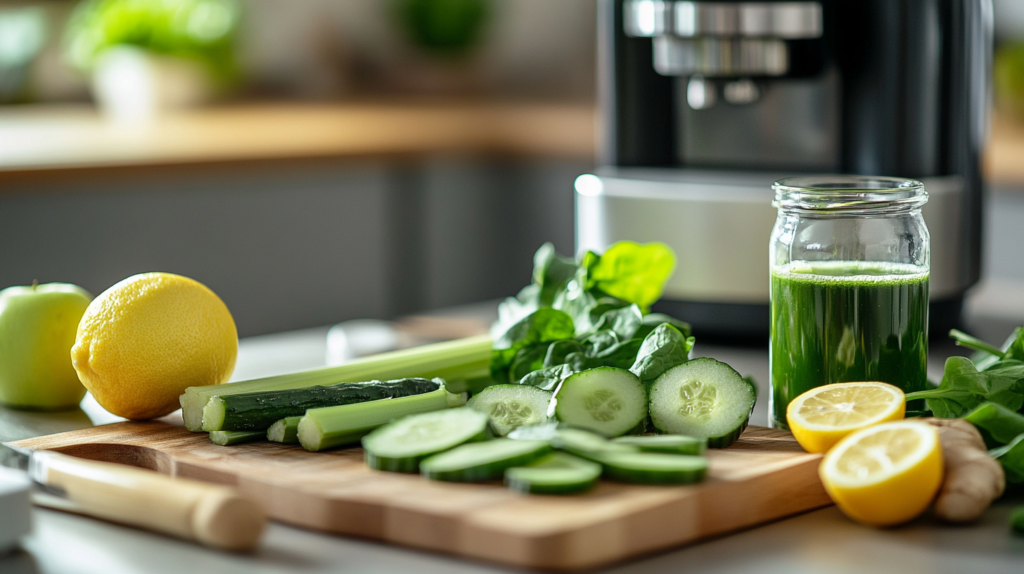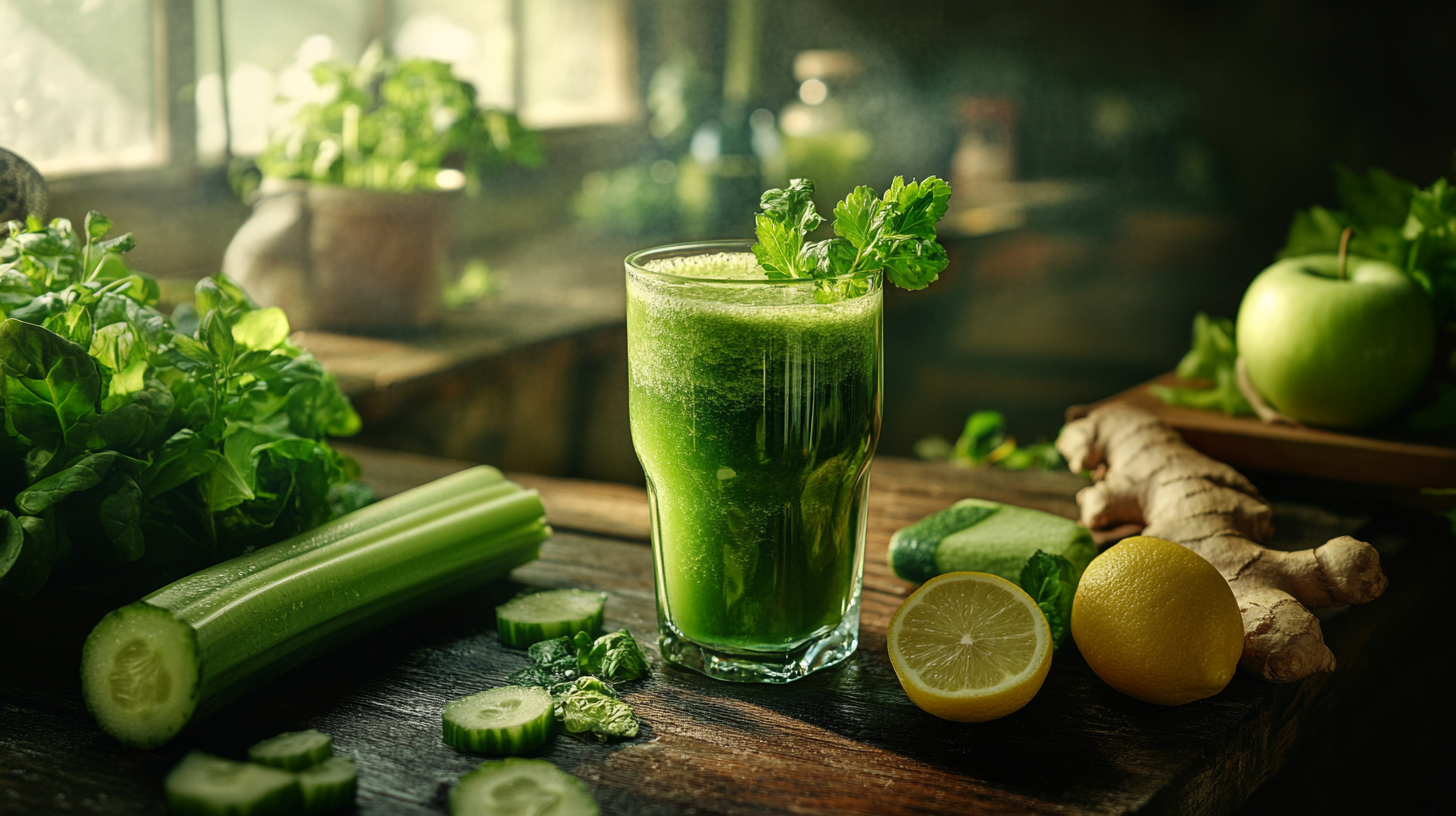If you are looking for a natural and effective way to lose weight, juicing can be a great addition to your diet. Fresh juices provide essential vitamins, minerals, and antioxidants while keeping calorie intake low. They help detoxify the body, boost metabolism, and curb cravings, making weight loss easier and more sustainable.
In this guide, you will find delicious and effective juicing recipes that promote weight loss, along with expert tips on how to make the most out of your juicing journey.
Introduction
Why Juicing Helps with Weight Loss
Juicing is more than just a trend; it is a powerful tool for weight loss and overall health. But how does it work?
- Low in Calories, High in Nutrients: Juices are packed with vitamins and minerals while staying low in calories.
- Boosts Metabolism: Ingredients like ginger, lemon, and green vegetables help the body burn fat more efficiently.
- Cleanses the Digestive System: Juices are easy to digest, allowing the body to absorb nutrients more effectively.
- Reduces Cravings: Drinking fresh juice before meals can help reduce hunger and prevent overeating.
“Juicing is like giving your body a reset button—it floods your system with nutrients while keeping calories in check.”
Table of contents
- Introduction
- Best Ingredients for Weight Loss Juices
- Top Juicing Recipes for Weight Loss
- How to Use Juicing for Effective Weight Loss
- Common Mistakes and How to Avoid Them
- Additional Tips for Maximizing Weight Loss with Juicing
- Frequently Asked Questions (FAQ)
- You May Also Like These Healthy Recipes
- Conclusion

Benefits of Juicing for a Healthy Lifestyle
Juicing is not only great for weight loss but also offers numerous health benefits:
- Detoxifies the body – Helps flush out toxins and improve digestion.
- Improves skin health – High vitamin C content promotes a natural glow.
- Boosts energy levels – Provides a natural energy boost without caffeine.
- Strengthens the immune system – Packed with antioxidants to support overall health.
If you are looking for a natural way to lose weight, feel energized, and improve your health, juicing is a great addition to your routine.
Best Ingredients for Weight Loss Juices
The key to effective weight loss juicing is choosing the right ingredients. Not all fruits and vegetables are equally beneficial for burning fat. Here are the best ones to include:
Low-Calorie Fruits for Juicing
Fruits add natural sweetness without artificial sugar. However, some are better than others for weight loss.
- Apples – High in fiber and low in calories, apples help keep you full.
- Berries (Strawberries, Blueberries, Raspberries) – Loaded with antioxidants, these fruits improve metabolism.
- Grapefruit – Known to burn fat and regulate blood sugar.
- Lemon and Lime – Boost digestion and alkalize the body.
“Fruits add a touch of natural sweetness to juices without piling on empty calories.”
Fat-Burning Vegetables to Include
Vegetables are the foundation of any good weight loss juice. They provide fiber, hydration, and essential nutrients.
- Spinach and Kale – Packed with iron, fiber, and antioxidants that help with digestion.
- Celery – Almost zero calories but full of water and essential nutrients.
- Cucumber – Keeps you hydrated and supports digestion.
- Carrots – Naturally sweet, full of beta-carotene, and good for metabolism.
Herbs and Spices that Speed Up Metabolism
Adding herbs and spices can enhance juices by boosting metabolism.
- Ginger – Increases calorie burn and improves digestion.
- Turmeric – Reduces inflammation and supports fat metabolism.
- Cinnamon – Regulates blood sugar and reduces cravings.
- Mint – Refreshes the body and improves digestion.
Best Liquid Bases for Weight Loss Juices
Instead of sugary store-bought juice, use healthy liquid bases such as:
- Coconut Water – Hydrating and full of electrolytes.
- Green Tea – Known for its metabolism-boosting properties.
- Aloe Vera Juice – Aids digestion and detoxification.
- Plain Water – The simplest and most effective base.
“The right combination of ingredients makes all the difference—choose wisely for maximum fat-burning benefits.”
Top Juicing Recipes for Weight Loss

Now that you know the best ingredients, let’s move on to making delicious weight loss juices.
Green Detox Juice for Fat Burning
This juice is packed with fiber, vitamins, and metabolism-boosting ingredients.
Ingredients:
- 1 cup spinach
- ½ cucumber
- 1 green apple
- 1 celery stalk
- ½ lemon (juiced)
- 1-inch ginger root
- 1 cup water
Instructions:
- Wash all ingredients thoroughly.
- Blend or juice everything together.
- Serve immediately for maximum nutrients.
Citrus Metabolism Booster Juice
Citrus fruits are known to boost metabolism and improve digestion.
Ingredients:
- 1 grapefruit (peeled)
- 1 orange (peeled)
- ½ lemon (juiced)
- 1-inch ginger root
- ½ teaspoon turmeric
- 1 cup coconut water
Instructions:
- Blend or juice all ingredients.
- Strain if needed.
- Enjoy a refreshing metabolism booster.

Belly Fat Burner Carrot Juice
Carrots are low in calories and rich in fiber, making them great for weight loss.
Ingredients:
- 3 large carrots
- 1 apple
- ½ inch ginger
- ½ lemon (juiced)
Instructions:
- Juice all ingredients together.
- Stir and serve immediately.
Refreshing Cucumber and Mint Juice
This juice is hydrating, detoxifying, and great for digestion.
Ingredients:
- 1 cucumber
- ½ lemon
- 4-5 mint leaves
- 1 cup water
Instructions:
- Blend or juice everything together.
- Strain if needed.
- Serve chilled.
“Juicing is about balance—finding the right mix of flavors that fuel your body while keeping it light and refreshing.”
How to Use Juicing for Effective Weight Loss
Drinking fresh juice is a great way to support your weight loss journey, but using it correctly is just as important as choosing the right ingredients. Let’s explore the best practices for when, how often, and how to incorporate juices into your daily routine to maximize weight loss results.
Best Times to Drink Juices for Maximum Results
The timing of your juice intake can make a big difference in how it affects your body and metabolism. Here are the best times to consume fresh juice:
- Morning on an Empty Stomach: Drinking juice first thing in the morning helps kickstart digestion and absorption of nutrients.
- Before a Workout: A low-sugar, high-energy juice (like a green juice with apple and ginger) provides an energy boost without unnecessary calories.
- Between Meals as a Snack: Helps control cravings and prevents overeating.
- Before Meals: Drinking a vegetable-based juice 20-30 minutes before a meal can help reduce appetite.
“Drinking juice at the right time can enhance digestion, boost energy, and help curb cravings throughout the day.”
How Often Should You Juice for Weight Loss?
To see results, consistency is key. But how often should you drink fresh juice?
- Daily Juicing: Drinking one juice per day is a great way to boost metabolism and reduce calorie intake.
- Juice Detox (Short-Term Cleansing): A 3-day juice cleanse can help jumpstart weight loss, but it should be done under supervision and balanced with proper nutrition.
- Long-Term Juicing: For sustainable weight loss, include juices alongside whole foods, rather than replacing all meals.
Should You Replace Meals with Juices?
While juice is nutritious, it should not completely replace solid meals for long periods. Here’s why:
- Juice alone lacks protein and healthy fats, which are essential for muscle maintenance and energy.
- It’s best to combine juicing with whole foods to get fiber, which keeps you full longer.
- Occasional juice fasting is okay, but for long-term weight loss, a balanced diet works best.
“Think of juicing as an addition to your diet, not a total meal replacement—it should complement, not replace, whole foods.”
Juicing vs. Smoothies: Which is Better for Weight Loss?
Juices and smoothies are both great for weight loss, but they have different benefits.
- Juicing: Extracts the liquid from fruits and vegetables, removing fiber. This allows for faster nutrient absorption, but it may not keep you full for as long.
- Smoothies: Blend the entire fruit/vegetable, keeping fiber intact. This slows digestion and keeps you full longer.
Which is better?
- If you want a quick nutrient boost, go for juice.
- If you need something more filling, choose a smoothie.
“Juicing and smoothies both have benefits—choose what fits your goals and lifestyle best.”
Common Mistakes and How to Avoid Them
Juicing is simple, but some common mistakes can slow down your weight loss progress. Let’s go over the biggest pitfalls and how to avoid them.
Adding Too Much Sugar and High-Calorie Ingredients
Many beginners accidentally overload their juices with too much fruit, which increases sugar and calorie intake.
How to Fix It:
- Keep juices at least 70% vegetables and 30% fruit to control sugar levels.
- Avoid high-sugar fruits like bananas, mangos, and grapes in juices.
- Choose low-sugar alternatives like berries, green apples, and citrus.
“Juicing should help you lose weight, not add extra sugar—balance your ingredients wisely!”
Not Consuming Enough Fiber in Your Diet
Since juicing removes fiber, it is important to get enough from whole foods throughout the day.
How to Fix It:
- Pair your juices with fiber-rich meals like salads, oats, or whole grains.
- Occasionally drink blended smoothies instead of juices to retain fiber.
- Add chia seeds or flaxseeds to your diet for extra fiber intake.
Relying Only on Juices Without Balanced Meals
Some people think they can lose weight faster by only drinking juice for extended periods. This can lead to muscle loss, low energy, and nutrient deficiencies.
How to Fix It:
- Use juice as a supplement, not your entire diet.
- Pair juice with lean proteins, healthy fats, and fiber-rich foods.
- Follow a well-balanced eating plan to support weight loss long-term.
“Juice is a great tool for weight loss, but it works best alongside a healthy diet, not as the only source of nutrition.”
Choosing Store-Bought Juices Instead of Fresh Juices
Many bottled juices claim to be healthy, but they often contain added sugars, preservatives, and fewer nutrients than fresh juice.
How to Fix It:
- Always choose freshly made juice over processed options.
- If buying store-bought juice, check the ingredient list for no added sugars or preservatives.
- Look for cold-pressed juices, as they retain more nutrients than heat-pasteurized ones.
“Fresh juice is always better than store-bought—maximize nutrients by making your own!”

Additional Tips for Maximizing Weight Loss with Juicing
Juicing is only one piece of the puzzle— for the best weight loss results, combine it with other healthy habits.
Combining Juicing with a Healthy Diet Plan
- Focus on whole foods like lean proteins, vegetables, and healthy fats.
- Avoid processed foods and refined sugars, which slow down weight loss.
- Stick to balanced meals, using juice as a supplement.
The Importance of Exercise While Juicing
Juicing helps detoxify and support metabolism, but exercise burns calories and builds muscle.
- Combine juicing with daily movement—walking, yoga, or strength training.
- Use pre-workout juices with citrus and ginger for energy.
- Post-workout, choose a protein-rich meal to aid muscle recovery.
Hydration and Why Water Matters
Juicing hydrates your body, but you still need water to stay fully hydrated.
- Drink at least 8 glasses of water per day.
- Add herbal teas or infused water for variety.
- Avoid sugary drinks like sodas or artificial juices.
“Water and fresh juice go hand in hand—hydration keeps your body functioning at its best!”
How to Store Fresh Juices for Best Nutrition
Fresh juices lose nutrients quickly, so proper storage is key.
- Drink juice immediately for the most nutrients.
- If storing, use an airtight glass container and refrigerate.
- Consume within 24-48 hours for the best taste and health benefits.
“The fresher, the better—drink your juice right away to maximize nutrients!”
Frequently Asked Questions (FAQ)
Juicing for weight loss is an effective and healthy approach, but many people have questions about how to do it properly. Here are answers to the most commonly asked questions about juicing for weight loss.
Can You Lose Weight Just by Drinking Juices?
Yes, juicing can help with weight loss, but it should not be the only part of your diet. While fresh juices provide essential nutrients, they lack protein, fiber, and healthy fats, which are important for a balanced diet.
For sustainable weight loss:
- Use juices as meal supplements, not replacements.
- Combine juicing with whole foods, such as lean proteins and healthy fats.
- Avoid high-sugar juices that can cause blood sugar spikes.
“Juicing is most effective when paired with a balanced diet and a healthy lifestyle.”
How Long Does It Take to See Results?
The time it takes to see weight loss results from juicing varies from person to person. However, here are some general expectations:
- Short-term results: Within a few days, you may feel lighter and more energized due to reduced bloating and detoxification.
- One to two weeks: Some people notice small weight loss changes, especially if they combine juicing with a clean diet.
- Long-term: Sustainable weight loss happens over several weeks or months when juicing is part of a healthy eating and exercise routine.
Are There Any Side Effects of Juicing?
Juicing is generally safe, but there are some potential side effects if done incorrectly.
- Hunger & Fatigue: If you replace all meals with juice, you may feel tired or constantly hungry due to a lack of protein and fiber.
- Blood Sugar Spikes: Drinking too much fruit juice can cause sugar levels to rise quickly, leading to energy crashes.
- Digestive Issues: A sudden increase in fruit and vegetable intake can cause bloating or stomach discomfort.
How to avoid side effects:
- Keep juices low in sugar and high in vegetables.
- Pair juices with healthy meals that include protein and fiber.
- Stay hydrated by drinking plenty of water throughout the day.
What is the Best Juicer for Making Weight Loss Juices?
The best juicer depends on your budget, time, and the type of juices you want to make. Here are the most common types:
Centrifugal Juicers: Fast and affordable but may generate heat, reducing nutrient retention.
Masticating (Cold-Press) Juicers: Extract more juice while preserving nutrients, but they are slower and more expensive.
Blenders (for Smoothies): Retain fiber and make thicker drinks, but do not separate juice from pulp.
For maximum nutrient retention and smooth juice, a masticating juicer is the best choice.
“Invest in a good juicer to make high-quality, nutrient-rich juices that support weight loss.”
You May Also Like These Healthy Recipes
If you’re looking for more nutritious and refreshing recipes to support your weight loss journey, check out these delicious options:
- Need a refreshing and detoxifying drink? Try this Carrot Juice Recipe: A Refreshing and Nutritious Drink for Every Day to boost your energy and improve digestion.
- Want a light yet satisfying breakfast? These Salmon Breakfast Recipes: Start Your Day with Flavor and Nutrition provide protein-packed meals to keep you full longer.
- Looking for a guilt-free treat? Healthy Desserts: Delicious, Guilt-Free Sweets for Every Occasion offers sweet treats without the extra calories.
- Need a bread alternative? The Ultimate Vegan Bread Recipe: Easy, Delicious, and Homemade is perfect for those seeking a nutritious, plant-based option.
- Want to add more superfoods to your diet? Purple Sweet Potato Recipes: Delicious and Nutritious Ways to Enjoy This Superfood is packed with fiber and antioxidants.
For more healthy and delicious recipes, visit Call Me Recipes and discover new ways to stay fit and nourished!
Conclusion
Juicing is a powerful tool for weight loss when done correctly. It provides a nutrient-rich, low-calorie way to detox, boost metabolism, and improve digestion. However, it should always be part of a balanced lifestyle, not the sole focus of your diet.
Key Takeaways for Juicing Success:
Choose low-sugar, high-vegetable juices to prevent blood sugar spikes.
Drink juice at the right times (morning, pre-meal, or as a snack).
Do not rely on juicing alone—combine it with whole foods and exercise.
Avoid common mistakes like too much fruit, store-bought juices, or extreme juice fasting.
Store fresh juice properly and consume it within 24-48 hours for the best nutrition.
If you are ready to start, begin with one juice a day and gradually integrate it into your routine. Listen to your body, stay consistent, and enjoy the journey toward better health and weight loss success.
“Juicing is not just about losing weight; it is about nourishing your body and feeling your best every day.”

